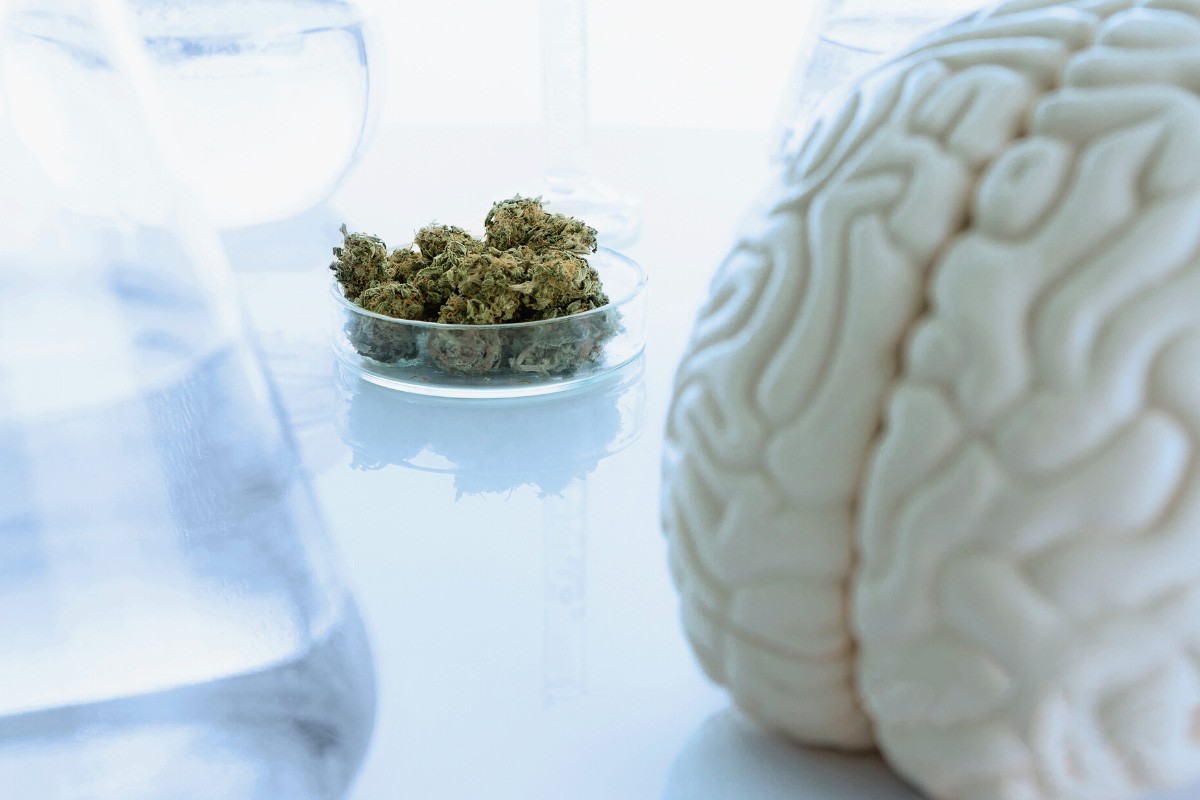- A Crohn’s disease patient reports: “Before cannabis therapy, every meal was torture, I had pain every time I ate something”
- Scientific study: Cannabis treatment significantly reduces the risk of follow-up surgery for Crohn’s disease
- Medicinal cannabis also shows positive effects in cases of irritable bowel syndrome and colitis
- The use of medicinal cannabis has impressive levels of patient satisfaction
Frankfurt/Main, April 7, 2022 – During the Easter holidays, many people will enjoy eating well again – lent is finally over. Sunny spring days are the perfect opportunity for a BBQ with family and friends. This is a time most people look forward to, especially after the long winter. For Dominik B. (29) from Bielefeld, for many years, these special moments were a heavy burden. Due to his bowel disease, he suffered pain after each meal, ate only as much as necessary, and regularly had cramps and diarrhea. Medical cannabis therapy successfully provided him with relief from his symptoms and improved his quality of life in the long term.
Dominik B. first experienced severe symptoms as a young man: He suffered from pain and diarrhea throughout his apprenticeship, which greatly affected his everyday life. He even suffered from joint inflammation on a regular basis, and he had difficulty working in his job as a tradesman. He had to avoid many types of foods, especially fatty foods and those that cause flatulence. “Every meal was torture, I had pain every time I ate something,” he reports. After being admitted to hospital in 2014 with high fever episodes, he was diagnosed with Crohn’s disease. After so many years, Dominik B. finally had a diagnosis that explained his symptoms. However, the list of medication he had to take got increasingly longer. After many changes and dosage adjustments, there was some improvement, but not to the extent he had hoped.
“Diarrhea caused me the biggest problems in my everyday life,” recalls Dominik. “I was barely able to take part in life, and when I did occasionally plan trips, I had to make sure I had access to a bathroom at all times.” In particular, the severe side effects of the cortisone were hard on him. While searching for alternative treatments, he came across studies on Crohn’s disease patients being treated with medical cannabis. He decided to try the treatment – and it was successful! “My pain levels are far more under control; I no longer have to use cortisone,” says Dominik B. today. “My inflammation levels have almost returned to normal; I am able to work again, my sleep has improved, and my appetite has increased. Enjoying a meal is no longer an impossibility.”
“Severe stomach pain, cramps, and vomiting: The chronic inflammatory intestinal disorder Crohn’s disease, which manifests as episodes of intestinal tract inflammation, often massively impairs those affected,” says Dr med. Julian Wichmann, physician and Managing Director of Algea Care, the first and leading Germany-wide platform for telemedicine-supported and evidence-based medical treatment with medical cannabidiol (CBD) and cannabis. “Patients experience extreme limitations in their everyday life. According to current medical knowledge, the condition is incurable. In Germany, approx. 250,000 people are living with the condition. Medical cannabis offers a promising and natural therapeutic option – especially in cases where the next step would be surgical removal of large sections of the intestine.”
Scientific study: Medical cannabis can significantly reduce the need for surgery in cases of Crohn’s disease
As an alternative to conventional treatment, medical cannabis has been the subject of ongoing worldwide research for many years. The findings are very encouraging: As part of a retrospective observational study, disease activity, medication use, the need for surgery, and hospital stays before and after cannabis treatment were investigated. With cannabis therapy, the need for a second operation, which without the therapy would be 38 percent of patients who have already undergone surgery, was reduced to 13 percent, a significant improvement of 25 percent. Also, the use of medications, such as steroids, was notably reduced. [1]
Two further studies on the efficacy and safety of medical cannabis and cannabis oil in the treatment of Crohn’s disease showed a higher rate of symptoms remission when compared to the placebo group. [2] Another study reported increased quality of life for Crohn’s disease patients following an 8-week course of treatment with cannabis oil, coupled with low Crohn’s disease activity index values, a central research parameter for symptom quantification.
Gut health – Medical cannabis for the treatment of irritable bowel syndrome and ulcerative colitis
In Germany, irritable bowel syndrome (IBS) is one of the most common intestinal disorders, with approx. 1,110,000 people affected. Sufferers report nonspecific abdominal pain and a feeling of discomfort. But constipation, diarrhea, flatulence, and bloating are also typical. “Treatment with cannabis or cannabidiol can play a role in relieving the symptoms of painful chronic gastrointestinal diseases. The anti-inflammatory and pain-relieving properties of the medical plant play the decisive role here,” explains Dr med. Julian Wichmann, physician and Managing Director at Algea Care.
In 2020, the data from 9,393 irritable bowel symptoms patients were evaluated during a retrospective cohort study: In patients treated with medicinal cannabis, the number of endoscopic examinations required and the length of hospital stay were significantly reduced. This finding could be explained by the positive influence of the cannabinoid THC on intestinal motility and symptom improvement. [3]
Cannabis is also an alternative treatment for patients with ulcerative colitis, which affects approx. 150,000 people in Germany. A double-blind, placebo-controlled study investigated the effects of a CBD-rich extract on remission rate in ulcerative colitis patients over a 10-week period. During the study, an improvement in the ulcerative colitis activity assessment was observed in the CBD group. Improvements in disease severity and patient quality of life were also reported. [4]
Patients suffering from chronic intestinal diseases are convinced of the efficacy of cannabis!
In light of these impressive case studies and scientific studies, it is not surprising that patients suffering from these chronic intestinal diseases are largely convinced of the potential of cannabis therapy: The latest survey data [5] from the German Crohn’s Disease/Ulcerative Colitis Association e.V. (DCCV) suggests that 93 percent of all cannabis therapy patients recommend this treatment for chronic intestinal diseases. 83 percent of patients observed a specific improvement in abdominal pain and sleeping problems. However, 52.9 percent of cannabis users purchase cannabis illegally, and, for 43.8 percent of patients who had previously used cannabis, the reason for discontinuation was a lack of access to cannabis, and, as we can reasonably assume, to competently supervised medical therapy.
Press office:
Algea Care GmbH | Jennifer Plankenbühler | Bethmannstraße 8 | 60311 Frankfurt a. M.
T +49 (0) 15 20 87 34 71 5 | Mail presse@algeacare.com
3K Agentur für Kommunikation GmbH | Feldbergstraße 35 | 60323 Frankfurt a.M.
T +49 (0)40 23 80 12 84 | Mail presse@3k-kommunikation.de
About Algea Care
Algea Care is the nation’s first and leading platform for telemedicine-supported and evidence-based medical treatment with medical cannabis. As a result of the approval of the medical use of cannabis in 2017, the company, founded in Frankfurt in 2020, has pioneered medical treatment using specific hemp components, e.g., cannabinoid oil (CBD). Algea Care is aimed at patients for whom conventional therapy was unsuccessful and who are now looking to natural medical products, such as cannabis, to treat their chronic illnesses and ailments (e.g., chronic pain, multiple sclerosis, epilepsy, Crohn’s disease, depression, ADHD, sleep problems). Achieving long-term improvements in patient quality of life is the focus of the efforts of the more then 220-strong Algea Care team.
Via the website www.algeacare.com, patients can quickly and easily request treatment and – after a careful medical examination of the patient’s documents – book an appointment at one of the currently 23 therapy centers in Germany. Physicians specially trained in the use of cannabis therapy and other natural medicinal products provide consultation and treatment. After the initial appointment at one our therapy centres, all follow-up appointments, if medically justifiable, can take place as a video consultation. Using state-of-art telemedical technology, Algea Care provides patients with a comprehensive range of services: our expert team is on hand to help patients schedule appointments and compile medical histories, to offer therapy support or to answer questions on medication and other related topics.








